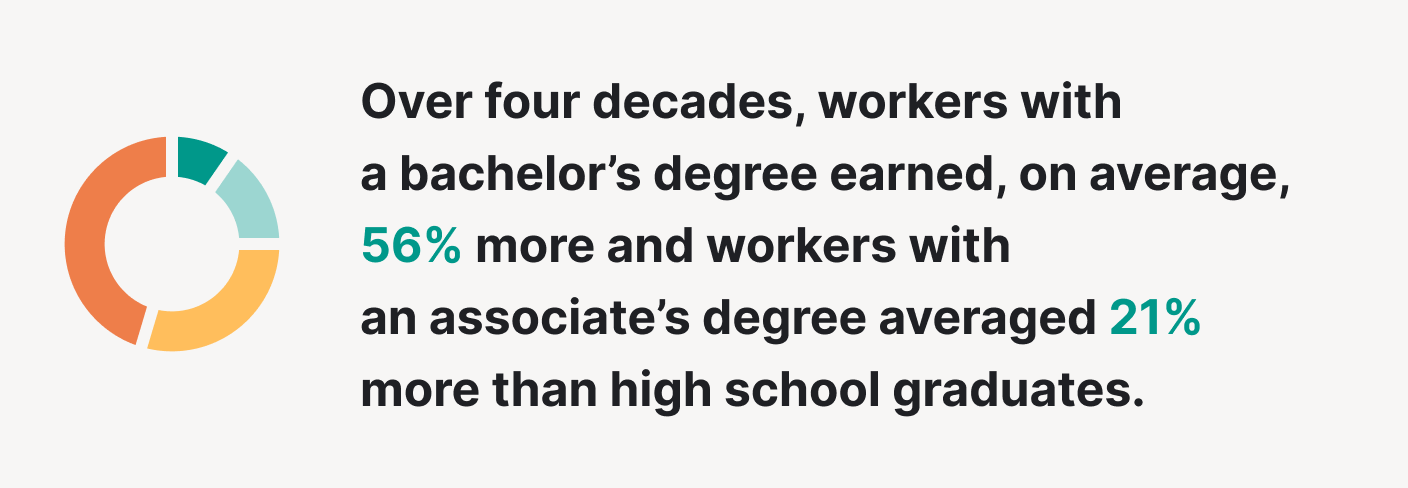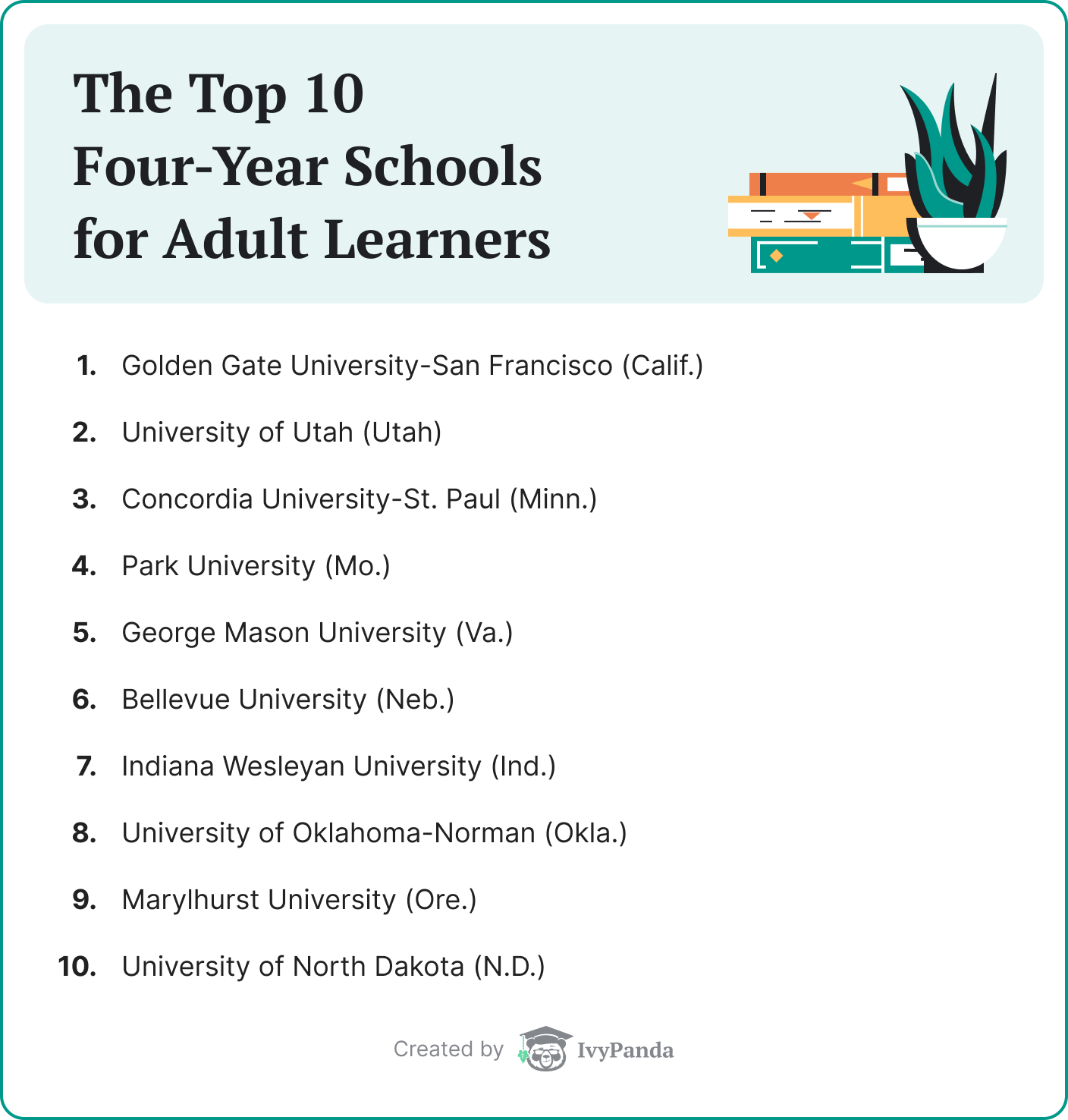Did you start a college course and not finish? Or did a gap year last a little too long? There are numerous reasons for postponing graduation. Health, family issues or financial problems could’ve prevented you from starting, or finishing, a college degree.
Regardless, now you’re thinking of getting that degree. This handy guide will assist you.
In this article, you’ll discover reasons for getting a degree as an older student.
On your road to graduation, problems are inevitable. Here you can learn ways to deal with them. Find information on possible scholarships and financial support, and check out our tips for successful study as an older student.
🎓 6 Reasons to Get a Degree
Individuals attend higher education institutions for various reasons. The older you get, the more your motivations evolve. For an older student, the reasons for getting a degree may differ from those of a recent high school graduate.
Here is a list of reasons why you should consider going to college as an older student:
1. An opportunity to change careers
Higher education is an obvious choice for individuals who aren’t satisfied with their job. Having chosen your profession at a young age, you may regret your decision, or be ready for a new challenge and career change.
College and university programs offer courses for all professions. This is your chance to acquire the necessary qualifications. You can switch jobs and finally feel like you are in the right place.
2. Promotion and salary boost
A potentially higher salary is a prominent motive to graduate. According to Jaison R. Abel and Richard Deitz, employees with a degree earn considerably more than those who do not. Getting a degree can offer a significant salary boost.

Some careers require not only a bachelor’s degree but also a master’s. You might be interested in career fields where postgraduate education is a necessity.
Some jobs require constant studying. Your current or potential employer may propose further education as a way to prepare staff for a new position. With additional training, an employee can become aware of new trends in their field and help companies grow.
3. Advancements in the career field
Today companies welcome new approaches and technological advances. Individuals may feel intimidated and overwhelmed by rapid changes in the industry. Colleges can help individuals follow trends in the professional sphere.
That is to say:
To keep up with new inventions and ideas, go to a higher education institution. It also prevents peers from replacing you. You can’t be afraid of young coworkers if you know more, or just as much, as them.
If you’re interested in your profession, you’ll relish in the opportunity to discover more on a topic. In a college or university, you can explore every aspect of your field. Tutors assist in organizing the educational process.
4. Satisfaction
Having started studying again, you may enjoy a feeling of achievement. A work routine often lacks a sense of accomplishment and appreciation. Individuals come home after a long day without contentment..
Finalizing an essay, finishing a project, or excelling in a test, each can boost your confidence and motivation.
Some people are self-conscious because they do not hold a formal degree. Completing a qualification can overcome this.
5. New social circles
Coworkers and family members are sometimes not enough. We often strive to communicate with new people. This is especially common for those who feel trapped at home. A person with severe movement and coordination problems or a housewife may revel in finding new social circles.
You can build personal and professional relationships in an educational setting. You have the opportunity to meet tutors who can provide work advice, and connect with fellow students.
6. Acquiring business knowledge
In an educational setting, you can develop skills for managing your own business. Youngsters usually aren’t thinking that far ahead. After several years of work, the idea of running a startup may seem natural. Many individuals look for MBA programs to climb the career ladder and become the boss of the company.

⭐ Benefits of Being an Older Student
Going to college or university as an older student can have challenges. However, there are merits that every older student should acknowledge.
The most prominent are:
- You have more life experience than before. You have time management skills and an understanding of your responsibilities and capabilities. You are more likely to stay organized than your younger classmates, and you will appreciate the time you spend at college more.
- Your goal is defined and precise. Most freshmen are unsure about their future and the reasons why they’re studying. Older students usually have a strong motive, whether it’s a change of profession or possible promotion. This can help you to stay focused and diligent.
- College struggles don’t seem that intimidating. You have overcome more serious challenges in your adult life. Dealing with taxes or raising a child is far more complicated than meeting an essay deadline. Those who have work experience are adapted to a competitive environment and aren’t intimidated by the possible adversarial nature of a study group.
- Studying may appear to be a lot more fun than you remember. After going through your daily routine, attending college is a new adventure. You can loosen up and treat learning as a break from work.
- For many adults, socializing becomes less problematic over time. Networking can be a significant part of professional life, and many young students are not ready for that or are lacking experience. Older students are prepared to build connections and understand their value.

⚔ Challenges of Going to College as an Older Student
Worried that you won’t be able to balance your work, family, and your studies? Concerned that you’re not smart enough or can’t deal with stress? Thinking about what your much younger classmates will think of you?
Such problems are common, but there are possible solutions.
⚖ Balancing work and studies
The fear of losing a job is a conspicuous one for older students. An academic calendar may interfere with working hours. In such a case, an individual may feel forced to choose between college and their career.
Don’t worry!
You don’t have to quit your job to graduate. You only need a flexible schedule.
Talk to your employer. Getting your degree will be much easier with their support. Outline your goals and motivations. Mention how beneficial this education will be for the company.
Pick an institution that suits your needs. Make sure it doesn’t require you to abandon everything in your life to attend courses full-time. Find a college with lessons after hours or on weekends. Just don’t forget to sleep.
Remember:
There are adult-friendly programs at universities. They offer classes that mix online tutoring and face-to-face meetings. Some of them provide credit for prior relevant work experience. This can help you graduate faster.
Online courses are also a great option. Not only are online courses a more affordable option for older students, they offer a way to study at your own pace. For individuals without a fixed work schedule, online courses are invaluable.
💰 Lacking financial capabilities
It’s no secret: colleges are expensive. The high price is the primary reason why many individuals didn’t graduate on their first attempt. Without financial support from parents or enormous savings, attending an institution may sound impossible.
Find discounts or financial aid—it’s not as difficult as it sounds. Many colleges provide convenient payment plans. Federal student loans are available for all ages.
If that’s not an option, look for other discounts. Maybe you have military benefits that can help pay for college. Look into available tax breaks that you can use for education. As an older student, you have many opportunities, so take advantage of them.
Consider online colleges as a more affordable option. They may require payment and SAT or ACT scores just like other educational settings. However, they are cheaper and often less complicated to get into. Some of them offer financial aid for older students who can’t pay.
Online colleges also provide certificate programs that can be completed in half a year or less. They require lower payments than regular institutions and can be enough for the salary boost or career change you seek. Some universities offer courses like MicroMasters for upskilling in your professional area. Such programs can help facilitate a promotion, as they give you credentials that employers recognize.
For those who don’t want to spend money on education, there is an alternative. You can try completing free online courses. It’s less time-consuming than participating in a degree program and you get to experience online education without any expense. Coursera offers a free trial and you can pay later to receive the course certificate or undertake more study opportunities.

Scholarships for Older Students
As an older student, you can apply for a grant. Financial aid doesn’t require repayment. Various associations, colleges, states, corporations, and federal government provide them.
Three grants for consideration:
- Adult Skills Education Program. For those who are IAF members (older than 19 years old) and willing to attend any participating Adult Skills Education Program school of their choosing.
- Live Your Dream Award. For women who serve as the primary source of financial support for their families, demonstrate financial need, reside in a Soroptimist International member country and have been accepted to an accredited vocational or undergraduate degree program.
- Higher Education Adult Part-Time Student Grant. For students who complete the Free Application for Federal Student Aid (FAFSA) and attend an eligible post-secondary institution in West Virginia. Applicants must also have been West Virginia residents for at least 12 months before applying and demonstrate financial need.
Some institutions offer scholarships and other forms of financial aid for older students. They differ from grants as they’re based on merit, not on need. You can find this type of financial aid for many situations.
For various scholarships, you’ll need to lots of documentation. Recommendations, essays, test scores, portfolios—many documents will be necessary and useful.
How to find an appropriate scholarship? There are a few places:
- Colleges and universities. Check whether the chosen educational institution offers scholarships for older students. You can find out more from official websites and forums.
- Companies and corporations. Tuition reimbursement programs are beneficial for both individuals and organizations. Employees get an opportunity to become more skilled, which benefits the company they work for. Ask your current employer whether they can help pay for your tuition.

- Associations and clubs. Some groups may sponsor education costs for their members. Look into whether any clubs you currently belong to offer this.
- Internet. Sometimes it’s more efficient to look through websites for scholarships. There are many specialized search engines.
11 scholarships for older students:
- Return2College
- Walmart Associate Scholarship
- Imagine America Adult College Scholarship
- Unigo $10k Scholarship
- Non-Traditional Students Scholarship
- American Legion Non-Traditional Student Scholarship
- After College Succurro Scholarship
- Alpha Sigma Lambda Scholarships
- College JumpStart Scholarship
- Small Business Scholarship
- Jack Kent Cooke Foundation Undergraduate Transfer Scholarship

👩👧👦 Being a single parent
Support from family members is crucial when you’re returning to study as an older student. This can be especially difficult if you are a single parent.
Taking online courses, such as those mentioned above, are often the best option for a single parent. This way you can stay at home, organize your time, fit your study around your schedule and continue to be available for your kids.
The thing is:
With online study, you may miss some opportunities. For example, people with poor self-organization can skip lessons easily and online courses may lack feedback and personal contact with a tutor. Plus, meeting new people and getting out can be incredibly helpful for single parents.
So, if you decide to go to college, follow these tips:
1. Find reliable childcare
You’re going to need a dependable place, where it’s safe to leave your kid for a day. College tutors are likely to be understanding of your situation, and be accommodating with regard to deadlines. However, regular absences will make studying difficult. Furthermore, no one wants their child to become a burden for other family members.
Look for childcare near your college or home. Get referrals from reputable sources such as administrative units or local centers. Visit the place and provide all the necessary documentation. Ask for financial aid, if possible.
Don’t be deterred by a waitlist. Usually, the sooner you submit a childcare application, the sooner your child can be accepted. However, rules differ from place to place. Familiarize yourself with the waitlist policies of your chosen childcare provider. Make sure there is a free space for your child before your studies begin.
Some colleges offer older students childcare on campus. Check whether your chosen educational institution offers this. Alternatively, include childcare in your search from the very beginning, when considering further education.

2. Manage your and your kid’s schedule
Thoughtful time-management is a necessity for single parents.
Set a strict bedtime for your child and yourself. Figure out the best time for you to study and the best time for you to rest. Living according to a schedule helps a family, especially when adapting to new challenges, such as additional study.
Fill your calendar with every event you will attend to avoid missed appointments. Schedule all activities in advance. Make everyone around you aware of your plans so that nothing can interfere. A calendar like this shows your family members when you may need their assistance. A good schedule has buffer time built into it to absorb emergencies.
To that end:
3. Don’t be afraid to ask for help from your family or friends
We don’t propose you become their headache.Instead ask your loved ones for aid in case of emergencies, or if you feel burned out. They will be happy to support you.
The critical part is:
Don’t exclude your children from the list of possible helpers. Explain your situation to them and why you need their assistance. Older kids can do chores, or cook once in a while. Teach younger ones how to be more independent, so you can get more free time.
4. Inform professors of your situation
Adapting to an educational environment is tricky. Don’t make it more complicated with unnecessary secrets.
Be upfront with your tutors about being a single parent. Their understanding will be crucial during the first weeks as you figure out your schedule. Professors can give you tips on time-management and help with deadline extensions, where necessary.

Keep in mind that tutors are also adults. You may connect with them quicker than with younger students. Their worldview may be rather similar to yours, and they will likely be both supportive and sympathetic.
5. Put less pressure on yourself
When you’re fed up with grown-up problems, going to college may lead to emotional burnout. Being a good parent and a reputable employee is hard enough, adding being a hard-working student to that can be tough.
Remember, you haven’t abandoned your child because you are now going to college. Just like you, your kid will benefit from this degree as well.
You don’t need to accomplish everything immediately. There will be difficulties along the way. Remember to be proud of yourself and your journey. Slow down and enjoy the studying process and special moments with your family.
6. Do homework with your child
Studying can be overwhelming at any age. Don’t hide your assignments! Prepare for studies together. Do your homework in the same room and have a break together. Bond over similar struggles and discussions about classmates and fellow students. Show your kid how to prepare for courses appropriately.
7. Seek financial aid
Paying for education is challenging in itself, let alone when you have a kid. You’ll be surprised to learn how many sources of financial support are out there.
Find an applicable government program for you. Look for available study allowances. Consider federal financial aid that is relevant for both younger and older students.
There are several grants and federal programs that are exclusive to single parents. The national government, local authorities, and educational institutions provide discounts and financial aid.
To get you started, check out:

Scholarships for single parents
Previously we explored the world of financial aid for older learners. Here we analyze possibilities exclusively available to single parents.
Child Care Access Means Parents in School Program support adults who need childcare assistance to graduate. States and educational institutions also offer such scholarships.
Scholarships for single parents include:
- Arkansas Single Parent Scholarship Fund
- ASSP Foundation Family Scholarship Fund
- BYU Marriott School Single Parent Scholarship
- David A. Hicks Memorial Scholarship
- Kathryn Kyriopoulos Colemere Endowed Scholarship
- LouEllen Dabbs Scholarship
- Peggy A. Stock Presidential Scholarship
- Single Parent Scholarship
- Steven K. Wright Scholarship
There are also scholarships available specifically for single moms:
- Deblinger Family Scholarship
- Ellen M. Cherry-Delawder Memorial Scholarship
- Frances M. Dunn Memorial Scholarship
- Jeannette Rankin Women’s Scholarship Fund
- Josephine Aguado Scholarship
- LiveYourDream $2,000 Scholarship
- Washington-Nixon Nursing Scholarship for Single Mothers
Financial aid specifically for single dads is harder to find. There are however options exclusively for males. Alternatively, you can explore other unique attributes about yourself that qualify for scholarships. It can be anything from different dietary habits to the history of cancer in your family.
🧓 Being older than your classmates
You may find younger student harder to relate to. That’s completely normal.
The good thing is though…
No one cares that much. Most students are too concerned with their own problems to pay close attention to your age. You may get a few questions or harmless jokes at the beginning of the year. However, everyone is likely to forget you are older.
Younger students offer older students a different perspective. Communication with youngsters may even help you better understand your own kids, if you have them.
Nowadays, there are many ways to facilitate your study process. You may not be familiar with them. Learn from your fellow students. Youngsters can show you convenient apps and explain how to use them. They can also give you tips on new learning methods.
Still not convinced?
Explore colleges that cater to older students. For example there are rankings which detail the best schools for Adult Learners.

📚 Struggling to study
Taking courses and learning tonnes of new material may seem impossible after years of routine work. New information may take longer to absorb than you might expect.
Fortunately, most older students adapt relatively quickly. Once you manage your new timetable and get used to doing homework, things get easier. You have studied before, and you can get the hang of it again!
Utilize your experience to the fullest. Now you understand responsibilities and what’s important. Single out crucial elements from each lecture, don’t take useless and unnecessary quantities of notes. Recall tips that you used in high school to stay focused and attentive. You can use college essay examples to your advantage, too. With their help, tackling some of the tasks is going to be easier.
Try new methods!
Examine new technologies and how you can use them in class. As we mentioned before, your fellow students can assist with this.
Reach out to an academic adviser to learn more about your opportunities and courses that are appropriate for you. With their help, you can optimize your study process. Don’t hesitate to seek their advice on various study-related questions. It’s their job.
You can also seek assistance from student support services. Their goal is to assist people with learning difficulties to achieve their full potential.

😰 Suffering from anxiety
After a few weeks of study, intrusive thoughts can become unbearable. You may suffer from anxiety, and feel as if going back to school is a mistake.
Your fears are common. To deal with them, identify your motivation. Why did you decide to go to college? What awaits you after graduation?
Remember your goals. You need a clear plan to deal with anxiety and focus on the bright side. Admit your concerns, attend courses, and try not to over think things.
You can see a psychologist. Psychological assistance is highly efficient for dealing with anxiety. It helps you gain self-confidence and patience. A psychologist can also help navigate family and work issues, procrastination, and other related problems.
You can get mental health aid from college counseling services on campus and online. With their recommendations, adjustment to your new educational setting will get easier.
Good news for you:
Most older students do not regret their decision to go to college.

💡 5 Tips on Attending a College as an Adult
Now that you’ve learned how to conquer possible fears and struggles, it’s time to check out our final tips. Follow these to make the most of your studies.
1. Find a school with prior learning assessment
Prior learning assessment refer to previous experience outside of the educational environment. All work, volunteering, military service, etc. can be relevant. Check whether your chosen college takes this into account.
2. Recall old material and pull up your transcripts
Find your old documents and notes. Submit your transcripts from previous study. Courses that are deemed relevant to your new major can be transferred and count towards the completion of your new studies. This means you can potentially graduate earlier. Provide recommendation letters from your old tutors, if possible. Submit certificates from projects related to your further education.
Check assignments and essays you have previously written. These may help you in your new course.
3. Embrace new technologies
Some tools may not have been around during your initial school years. Typing your notes on a laptop can be a lot quicker than writing. Recording lectures can also be life-saving for days when you’re too tired to pay close attention. Apps for memory training and proofreading your papers can prove invaluable.
4. Be realistic
To finish your studies, your goals need to be realistic. You need to estimate how long it will take you to complete the course. When you have a job or a kid to raise, you may not have four years to devote to college. If that’s the case, don’t overextend yourself, instead find a shorter course.
5. Seek support at home and at school
Quit dealing with your struggles alone. Share your worries with loved ones to reduce stress. Academic counselors, various college services, and student associations can also provide physical and mental aid. Similarly, your fellow students will understand your plight and will serve as a wealth of support and understanding.
Thanks for reading! We would love to hear your opinions in the comment section below.

![27 Public Speaking Anxiety Tips [+ Bonus: Online Courses]](https://ivypanda.com/blog/wp-content/uploads/2019/07/microphone-with-unfocused-background-audience-309x208.jpg)
![10 Full Scholarships for International Students in the USA [2026]](https://ivypanda.com/blog/wp-content/uploads/2020/11/asian-students-are-using-computer1-309x208.jpg)
![How to Pass Exams with Top Grades: 15 Tips [2026 Updated]](https://ivypanda.com/blog/wp-content/uploads/2020/11/reading-making-notes-309x208.jpg)